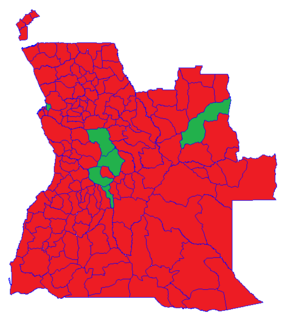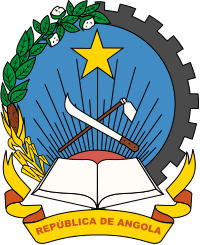2017 Angolan legislative election
Legislative elections were held in Angola on 23 August 2017,[1] although voting was delayed until 26 August at 15 polling stations due to bad weather on election day.[2] The top candidate of the winning party automatically becomes President after the election in accordance with the new 2010 Constitution. The ruling party MPLA headed by João Lourenço was widely expected to win. Preliminary results show that MPLA won with a clear margin.[3] The final results were released on 6 September 2017.[4]
| |||||||||||||||||||||||||||||||
This lists parties that won seats. See the complete results below. | |||||||||||||||||||||||||||||||
 Winning party in each municipality | |||||||||||||||||||||||||||||||
| |||||||||||||||||||||||||||||||
 |
|---|
| This article is part of a series on the politics and government of Angola |
|
Executive |
|
Legislature
|
|
Judiciary
|
|
|
Administrative divisions |
|
|
Background
Initially it was thought that long-time President José Eduardo dos Santos would lead the ruling MPLA into the election before possibly stepping down in 2018, but in December 2016 the MPLA designated João Lourenço, the Minister of Defense and Vice-President of the MPLA, as the party's top candidate and therefore its presidential candidate.[5] Lourenço was viewed as strongly loyal to dos Santos. Bornito de Sousa was designated as the party's vice-presidential candidate.[6]
In April 2017, the Council of the Republic, which acts as an advisory body to the President, proposed holding the election on 23 August 2017.[7] It was announced on 26 April that dos Santos had formally approved the proposed date.[8]
In early July 2017, National Electoral Commission (CNE) stated that it was expecting 3,000 national and international election observers in the country during the elections.[9]
On 21 July 2017, the National Assembly approved legislation that would keep top security officials (the chiefs of the army, police and intelligence) in place for eight years, thereby preventing presidents from choosing the occupants of those posts at will.[10]
The official campaign period ran from 22 July to 21 August.[11]
Electoral system
The 220 members of the National Assembly are elected by two methods; 130 are elected by closed list proportional representation in a single nationwide constituency, with seats allocated proportionally. 90 are elected in 18 five-seat constituencies, using the d'Hondt method.[12][13] Voters must be at least 18 years old and not have an undischarged bankruptcy, criminal conviction, dual citizenship or have been declared insane. Candidates must be at least 35 years old.[12]
Results
Preliminary results released shortly after the election showed the MPLA with 64.8% of the vote. Final results released by the electoral commission on 6 September 2017 showed the MPLA receiving 61% of the vote, giving it a parliamentary majority of 150 out of 220 seats and ensuring that João Lourenço would become President.[14]
.svg.png) | ||||||||||||||
| Party | Votes | % | Seats | +/– | ||||||||||
|---|---|---|---|---|---|---|---|---|---|---|---|---|---|---|
| MPLA | 4,164,157 | 61.08 | 150 | –25 | ||||||||||
| UNITA | 1,818,903 | 26.68 | 51 | +19 | ||||||||||
| CASA–CE | 643,961 | 9.45 | 16 | +8 | ||||||||||
| Social Renewal Party | 92,222 | 1.35 | 2 | –1 | ||||||||||
| National Liberation Front of Angola | 63,658 | 0.93 | 1 | –1 | ||||||||||
| National Patriotic Alliance | 34,976 | 0.51 | 0 | New | ||||||||||
| Invalid/blank votes | 275,125 | – | – | – | ||||||||||
| Total | 7,093,002 | 100 | 220 | 0 | ||||||||||
| Registered voters/turnout | 9,317,294 | 76.13 | – | – | ||||||||||
| Source: CNE | ||||||||||||||
Opposition appeal
On 27 August Samakuva challenged the election results.[15] On 8 September, UNITA filed a lawsuit claiming evidence of voter fraud.[16] However, the Constitutional Court rejected the opposition's appeal on 13 September.[17] It was announced that Lourenço would be sworn in on September 26, 2017.[18]
References
- Polls Close in Angolan Election That Ends Dos Santos's Rule Bloomberg, 23 August 2017
- Angola: 1310 voters will vote only on Saturday TSF, 24 August 2017
- "Angola's ruling party 'wins election'". BBC News. 2017-08-25. Retrieved 2017-09-13.
- "MWAGIRU: Angola's new era as Kenyan poll row ends in court". Daily Nation. Retrieved 2017-09-13.
- Herculano Coroado, "Angola's Dos Santos not up for re-election in 2017 - party document", Reuters, 3 December 2016.
- "Dos Santos picks his man", Africa Confidential, volume 57, number 25, 16 December 2016.
- "Angola's presidential council proposes Aug. 23 for national vote", Reuters, 24 April 2017.
- "Angola president sets Aug 23 for general elections", Reuters, 26 April 2017.
- "Angola invites 3,000 observers for August 23 general elections". Africanews. 3 July 2017.
- "Angola adopts law limiting power of future presidents", Agence France-Presse, 21 July 2017.
- "Angola : début officiel de la campagne pour les élections générales d’août", Agence France-Presse, 22 July 2017 (in French).
- Electoral system IPU
- Lei Orgânica sobre as Eleições Gerais n.º 36/11, de 21 de Dezembro Archived 2017-05-17 at the Wayback Machine CNE
- "Angola's ruling MPLA won August 23 polls by 61% – final results", Africanews, 6 September 2017.
- Angolan opposition challenge election results Africa News, 27 August 2017
- Angola's opposition appeals election results Reuters, 9 September 2017
- Angola’s Constitution Court rejects appeal to annul election results Standard Digital, 14 September 2017
- "Archived copy". Archived from the original on 2017-09-25. Retrieved 2017-09-25.CS1 maint: archived copy as title (link)